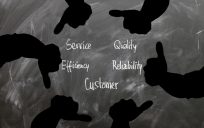I work with a particular government agency that is quite hesitant about entering the social world due to legal and liability concerns. The problems seem to always revert back to the inability to monitor and edit the content posted on the agency’s social sites. My question is: How is every other government entity out there doing it? Even the White House has a facebook page!
As of now, the current (outdated) privacy policy states that the official use of social sites raise significant legal risks in terms of privacy, security, and federal records management. The policy also states that any potential use of social networking sites must not incorporate any logo or intellectual property belonging to the government agency.
The stubborness is frustrating to say the least… However, in order to turn this view around, I’ll need to prove exactly how other Gov agencies are getting around the liability issues. I’m turning to the GovLoop community for help. Can anyone shed some light on this for me?




We are currently using Twitter and YouTube and have yet to see the full influx of this issue… but what we have done is start the ball rolling by researching existing, high-profile examples already in the government, your example of the Whitehouse Facebook is a good one. We borrowed some resources out there in the GSA web and a few others and prepared a white paper for our small agency heads. Next, we implemented a small project where we could “test” how it went (we started with Twitter). Later, when that turned out to be not so scary, we worked on YouTube. With YouTube, we joined with the Government Channel and worked with our Agency on the legal side. It turned out they already had it all in place we just needed to join up. We haven’t widely advertised our YouTube space yet as we’re compiling videos now and are still considering how to address comments. We may turn them off. Most recently we’ve been reading everything we can get our hands on for Open Government and the implications there. We’ve drafted suggested policy specifically for Social Media and a handbook of steps to get authorization from our Agency to do the various pieces and reference all the new documents to give it authority and weight… now we’ll see how that goes for a while until we take the next steps… We’re currently drafting a translation disclaimer for our YouTube site to prevent people assuming the new tools mean it is our responsibility to ensure the translations are perfect! Once drafted we’ll run that past our legal staff and post on YouTube. How about everyone else? How are you making progress and addressing the legal stuff?
James, great topic. I am very interested in this discussion as well. We’re going to bring together some top local gov folks together tonight on #localgovchat. I just posted something similar – but not nearly as nicely put – here http://bit.ly/aA13Ok. Please feel free to join us tonight.
That’s a hard position to be in — I’m all for social media in gov’t, time to change, innovation highway, etc, etc. But I also think that phrase about significant legal risks in terms of privacy, security and frm is important. The higher in the food chain, the more natural it is to think about risk in those terms. When you present your ideas about getting around these liability issues, would it help to frame things in terms of email? — When email came around, risk managers and lawyers were concerned about the implications. Simple old-fashioned email makes records management messy, and there are privacy and security problems every time you hit send. Some say that Reply All in email was the first social media, so in a sense the argument is one of degree.
Also, I’m curious what do you mean by “inability to monitor and edit the content posted”?
I think the key here is that government’s need a willingness to manage risk. Not embrace risk or flee from it (which is generally the norm), but manage it.
That means doing a careful analysis of what risk is present. Look for ways to reduce or mitigate it. Then weigh the remaining risk against potential benefits. Risk is a cost. As long as the benefits outweigh the costs, proceed.
The actual legal and liability concerns around social media will vary according to which social media is used and what jurisdiction you are in. I don’t have the details handt from the legal analysis that was performed by our counsel but I remember a key part of the advice was that we set up the rules in advance beforehand, clearly communicate them, and stick to them.
One more thing: You mention “intellectual property belonging to the government”. I was under the impression that one of the ways our two jurisdictions differed was that in the States there was no intellectual property belonging to the government – it’s all public domain. Is that not the case?